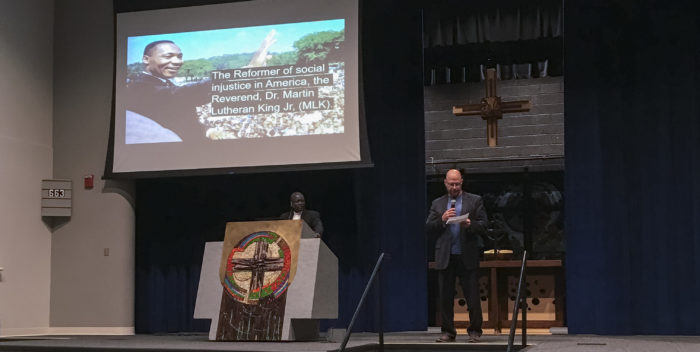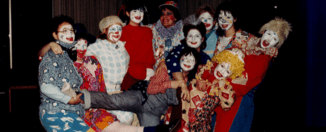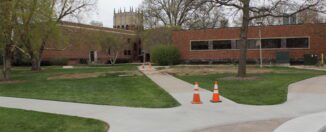Rev. John Deang Speaks on MLK and Nonviolence
University Provost Dr. Tim Preuss introduces Rev. John Deang to speak on Martin Luther King’s life and legacy in honor of MLK day. Photo by April Bayer.
by April Bayer
Concordia recently hosted speaker Rev. John Deang who, along with several members of his church, shared thoughts on Martin Luther King, Jr.’s legacy and his dedication to nonviolent human rights advocacy in his presentation “MLK as the Reformer of Social Injustice in America.”
Deang is the pastor of Hope Lutheran Church in Omaha, a congregation where a variety of cultures are represented. He immigrated to the United States from Sudan as a young man and has a long history in multicultural ministry.
“I think without (Dr. King) I wouldn’t be where I am today because he wanted everyone to be equal, and everyone to have the same opportunities in education, and thinking of everyone as the same. So it’s because of him that I’m here today,” Deang said.
Deang graduated from Concordia in 2002 and from Concordia Theological Seminary Fort Wayne in 2006. He served as a missionary-at-large to African immigrants for the Lutheran Church–Missouri Synod Nebraska District from 2006-2013. He also aided the Bishop of the Evangelical Lutheran Church of South Sudan and Sudan with church leadership training and other projects from 2013-2015.
Students, faculty and community members gathered in Weller Auditorium on Tuesday, Jan. 29 to listen to Deang’s presentation, which was hosted by the Student Committee for Diversity and Inclusion.
Deang began by giving a brief overview of King’s life and explained how his reform efforts furthered equality and human rights for a variety of oppressed groups of people. He also praised King’s commitment to nonviolence, which was grounded in his Christian faith and went on to influence reformers like Nelson Mandela in Apartheid-era South Africa.
“If you (advocate) with justice, then you will be free,” Deang said. “That’s something we have to explain to people. It will not take you anywhere if you use violence. It is the work of each and every one of us to reach out to people and explain our opinions and our thoughts.”
The second half of the presentation featured a dialogue between the audience and members of Deang’s church, where three of his congregants shared their thoughts on racial inequality and their experiences living as African-Americans in the U.S. during King’s protests.
Arthur Alston, a Vietnam War veteran and former NASA employee, shared his memories of the violent fighting he witnessed in Vietnam on the day King was assassinated and the discrimination he faced when he returned home.
“I was fighting new wars,” Alston said. “One war I was fighting was a war over there (in Vietnam). The second war I was fighting was for coming back. The third war I was fighting for my color, my identity. The other war was (for) my manhood.”
As a Nebraska native, Alston said that he had never experienced racism like what he encountered when he was transferred from Vietnam to Corpus Christi, Texas, where he was unable to get a haircut, find a job, or financially support his four children as a single father.
“What we have to do is understand that we all have red blood, and we’re all God’s children,” Alston said. “My color is for a reason. I’m not gonna fight you, but I’m gonna show you my scars.”
Later in life, Alston found success in working for NASA, assisting in programming orbiters and the third-generation Hubble telescope, along with many other accomplishments.
“The bottom line is love. That heals all things,” Alston said. “Now I’m gonna walk out of here, and I’m gonna meet the Lord someday. I’m gonna leave this all forgotten, and then (it will) be your war, not mine.”
Arthur Alston’s wife, Karen, talked about the importance of multicultural education and interacting with people from diverse backgrounds.
“We have to learn each other’s cultures, not dismiss them, but learn from them,” Karen Alston said. “I have to know who you are, and you have to know who I am, and we can respect that in each other…That way we can come together and love each other for who we are.”
Angelene Moore, another member of Deang’s church, shared her memories of King’s speeches and why his message is still important for Christians today.
“(Martin Luther King) could carry a people. When he spoke, his voice rung out like music, and that’s why he had so many followers,” Moore said. “We need another Martin Luther King today, no matter be it black, white, Asian, whatever. We need another strong leader to lead us the right way, in the Christian way.”
The Student Committee for Diversity and Inclusion will be hosting several other events to honor King’s legacy and Black History Month, including a Black History show in Weller Auditorium at 7 p.m. on Feb. 1 and a showing of “12 Years a Slave” at 7 p.m. on Feb. 18. To learn more about Deang and these upcoming events, visit Concordia’s website.













